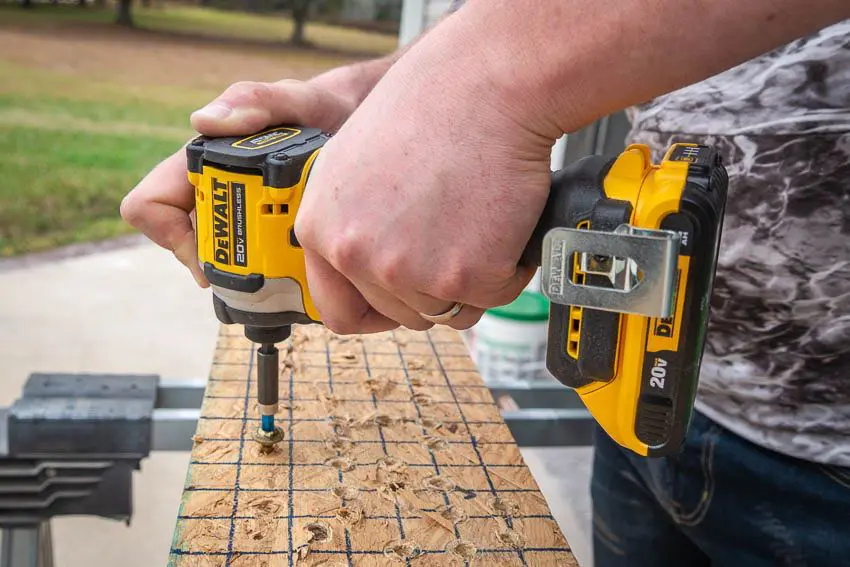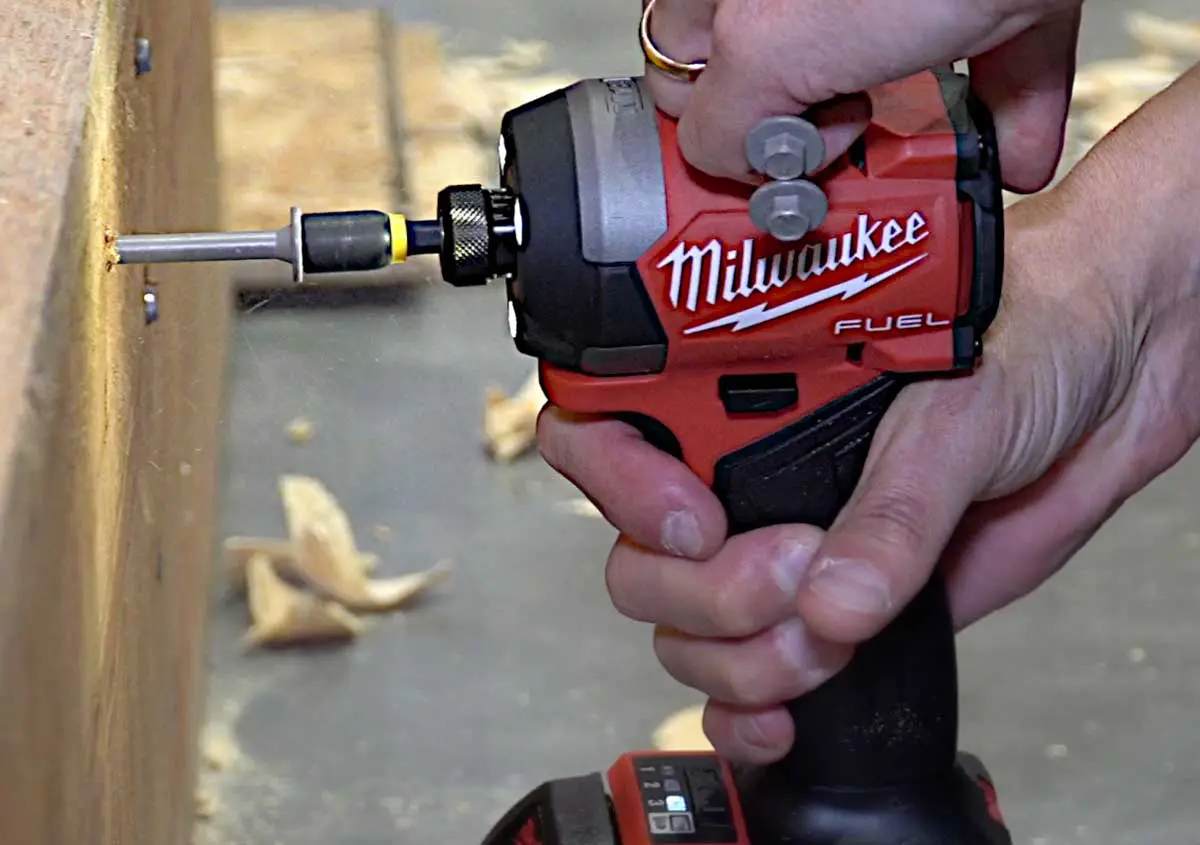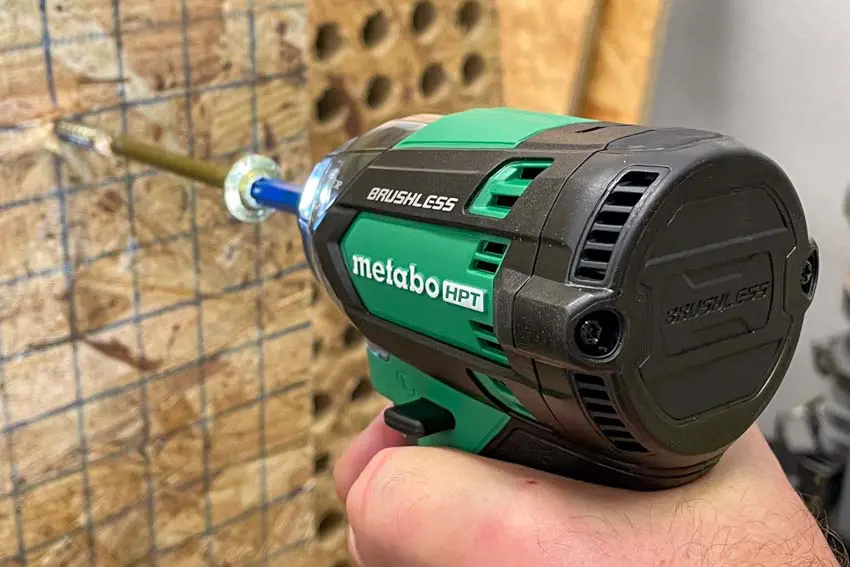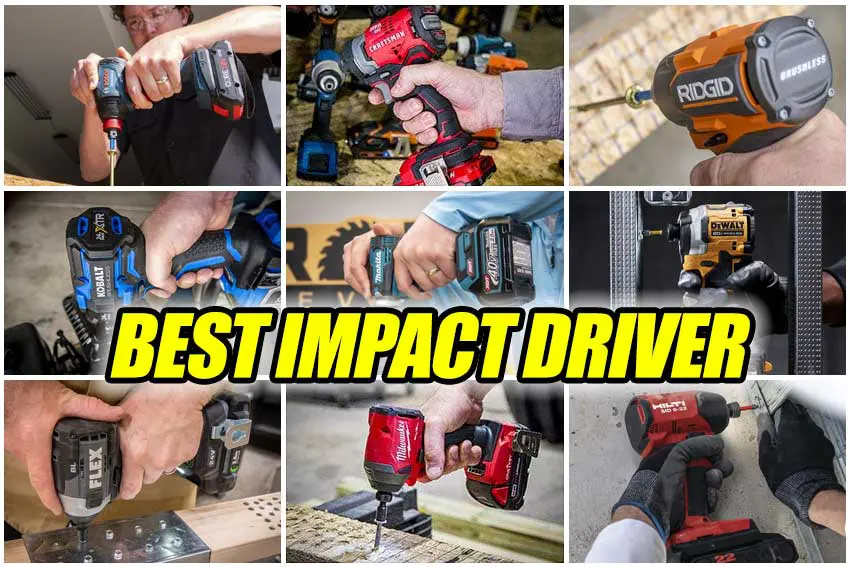We’ve tested dozens of the impact drivers currently available to find out who makes the best impact driver in multiple classes. Our impact driver reviews test these tools to see who performs best in various applications to discover what they’re capable of. There are some impressive new players entering the scene that look to challenge the traditional powerhouses. When it was all said and done, the biggest names still stepped up to the plate.
Our Best Impact Driver Top Picks
- Best Overall: Milwaukee M18 Fuel 2953
↓ Jump to this Impact Driver - Best Compact: DeWalt Atomic DCF850
↓ Jump to this Impact Driver - Most Powerful: Flex 24V Quick Eject
↓ Jump to this Impact Driver - Best 12V: Milwaukee M12 Fuel 3453
↓ Jump to this Impact Driver - Best for the Money: Metabo HPT WH18DCM
↓ Jump to this Impact Driver
Best Overall Cordless Impact Driver

Milwaukee M18 Fuel 2953
- Top Speed: 3900 RPM
- Max Torque: 2000 in-lbs
- Impact Rate: 4400 IPM
- Length: 4.5 in
- Weight: 2.2 lbs bare
If you’re looking for the best combination of performance, size, and weight, look no further than Milwaukee’s M18 Fuel impact driver in its fourth generation. Second only to Flex in our performance tests, it’s significantly smaller and lighter. Pros also can’t ignore that Milwaukee has one of the most extensive selections of tools that work on M18 batteries.
Milwaukee’s bumped up the speed on the latest model. It increases 300 RPM to drive at a maximum speed of 3900 RPM. That also comes with a slight increase in impact rate to 4400 IPM. Notably, Milwaukee made some adjustments to the trigger. It’s now capable of smoother acceleration to give you more control over your screw starts. I find that particularly helpful when starting self-tapping screws. All of the improvements come with absolutely no change in weight. You can find a cheaper impact driver, but you won’t find a better tool for lightweight performance.
Pros
- Very-compact, lightweight
- Oodles of power
- Excellent trigger control
- Shadowless LED light
- 5-year warranty
Cons
- Expensive
Hands-on Testing Results
| Milwaukee 2953 | 5.0Ah Battery | 6.0Ah Forge |
|---|---|---|
| Large Lag Bolt Test | 1.88 in. | 0.88 in. |
| Small Lag Bolt Test | 6.36 sec | 5.80 sec |
| RSS Screw Avg | 7.28 sec | 5.90 sec |
| Spade Bit Avg | 5.22 sec | 4.54 sec |
| Concrete Bit Avg | 6.73 sec | 7.74 sec |
| Nut-Busting Total | 3.47 sec | 3.02 sec |
Best Lightweight and Compact Cordless Impact Driver

DeWalt 20V Atomic DCF850
- Top Speed: 3250 RPM
- Max Torque: 1825 in-lbs
- Impact Rate: 3800 IPM
- Length: 4.0 in
- Weight: 2.1 lbs bare
For many folks, moving to a 12V system is the way to go for the best lightweight and compact impact drivers. However, DeWalt’s DCF850 gets into really tight spots while remaining on its massively popular 20V Max battery system. To keep the weight down, stick with a 2.0Ah battery or consider going with the 1.7Ah PowerStack battery for an even lighter working weight while boosting performance.
There is a trade-off in going this small, though. We like this model for most self-tapping screws, deck screws, and the like. Get into heavier loads, however, and that 1.7Ah PowerStack battery seems to give up a bit too easily. Step up to the 5Ah pack for more consistent power. Overall, if you plan to mostly drive larger fasteners such as ledger, RSS, or timber screws, you may even want to select a stronger (though larger) DeWalt impact driver like the DCF887, DCF845, or DCF860.
Pros
- One of the most compact impacts
- Respectable power
- Shadowless LED light
Cons
- Gives up power for size
Hands-on Testing Results
| DeWalt DCF850 | 5.0Ah | 1.7Ah PowerStack |
|---|---|---|
| Large Lag Bolt Test | 3.7 in. | DNF |
| RSS Screw Avg | 15.5 sec | DNF |
| Nut-Busting Total | 10.95 sec | 10.02 sec |
Most Powerful Cordless Impact Driver

Flex 24V Quick Eject FX1371A
- Top Speed: 4000 RPM
- Max Torque: 2500 in-lbs
- Impact Rate: 4450 IPM
- Length: 4.8 in
- Weight: 2.8 lbs bare
If sheer performance is your highest priority, you have to go with Flex’s 24V impact driver. Already near the top with a standard battery, it took the number one spot in nearly every test we ran once we added a Stacked Lithium battery. The trade-off is a bit more size and weight than you’ll find with Milwaukee, but there’s no question that Flex makes the highest-performing impact driver to-date. As a bonus, it retails for a very compelling price compared to its competitors.
While there’s no one-hand bit insertion or active spring ejection, the Flex 24V Brushless Impact Driver introduces a Quick Eject feature. You can push the button just above the trigger to push the collet forward to the open position. That means you don’t have to move your hand from the handle to switch bits. It’s especially helpful when you’re working at height or in areas where there’s no easy place to set the tool down.
Overall, Flex has established the fact that it can top the power charts while providing flagship-quality features and excellent value.
Pros
- One of the most powerful impact drivers we’ve tested
- Hands-free bit ejection
- 5-year warranty
Cons
- Heavier than most flagship impact drivers
Hands-on Testing Results
| Flex FX1371A | 5.0Ah Battery | 6.0Ah Stacked |
|---|---|---|
| Large Lag Bolt Test | 3.0 in. | 0 in. |
| Small Lag Bolt Test | 5.72 sec | 5.07 sec |
| RSS Screw Avg | 6.36 sec | 6.70 sec |
| Spade Bit Avg | 4.99 sec | 4.85 sec |
| Concrete Bit Avg | 6.29 sec | 5.77 sec |
| Nut-Busting Total | 5.11 sec | 4.08 sec |
Best 12V Cordless Impact Driver

Milwaukee M12 Fuel 3453
- Top Speed: 3600 RPM
- Max Torque: 1500 in-lbs
- Impact Rate: 4000 IPM
- Length: 5.0 in
- Weight: 2.0 lbs bare
Milwaukee’s third-generation M12 Fuel impact driver has been tough to beat. Its combination of 3300 RPM and 4000 IPM kept it running faster than any other 12V model we’ve tested. Milwaukee continues to improve its core 12V models while further reducing size and enhancing features.
As part of an incredibly deep line of compatible 12V tools, this Milwaukee M12 Fuel impact driver has little in the way of competition.
Trigger control is smooth, and this diminutive tool puts out an impressive amount of power. I tested it by driving a series of ledger screws as well as large lag bolts. In both tests, the tool performed quickly and confidently. With ledger screws, the tool drives these fasteners smoothly enough to make it a go-to tool for smaller jobs that involve even longer fasteners. I’d still use a more powerful 18V tool for a full decking project or similar, but this 12V tool definitely punches above its weight class.
Pros
- Excellent power-to-weight ratio
- High-coverage LED illumination
- 4-mode drive control
- 5-year warranty
Cons
- None at this price
Best Cordless Impact Driver for the Money

Metabo HPT 18V WH18DCM
- Top Speed: 3700 RPM
- Max Torque: 1859 in-lbs
- Impact Rate: 4000 IPM
- Length: 4.5 in
- Weight: 2.0 lbs bare
Metabo HPT raised eyebrows when it launched its innovative Triple Hammer impact driver design. Several years in, it’s now had time to prove itself in the field as a design that offers high performance and the durability to thrive on professional jobsites. On top of that, the 18V model is lightweight and compact, making it a go-to choice that pairs well with a compact 2.0Ah battery. Plus, the newest version includes a specific mode for working with nuts and bolts.
In our testing, it performed adequately in breaking bolts fastened to 150 ft-lbs and was one of the quickest at driving RSS screws into our stacked OSB boards. While the Metabo HPT WH18DCM consistently fell in the middle of the pile of models tested, it remains one of the best values on the market.
The bare tool costs $129, while a kit with two 2.0Ah batteries and a charger costs just $169. Add Metabo HPT’s lifetime warranty on their lithium-ion tools, and you’ll have a tough time finding a better overall bang for your buck.
Pros
- Excellent value
- High-coverage LED illumination
- Limited lifetime warranty
Cons
- None at this price
Our Process and the Nitty Gritty
- Why You Can Trust Pro Tool Reviews
- Other Impact Drivers We Tested
- More Recommendations from Brands We Trust
- Best Impact Driver Bits
- What are Impact Drivers Used For?
- What to Look for When Buying an Impact Driver
Why You Can Trust Pro Tool Reviews
Ever check out a “review” site and can’t tell if they actually tested the tools or if they’re just “recommending” the Amazon top sellers? That’s not us. We won’t recommend anything unless we’d use it ourselves, and we don’t care who the primary retailer is. It’s all about giving you a legitimate recommendation and our honest opinion of each product.
We’ve been in business since 2008, providing tool reviews and reporting on industry news in the construction, automotive, and lawn care industries. Our Pro reviewers work in the trades and have the skills and experience to know whether tools can perform well in the field.
Each year, we bring in and review more than 250 individual products. Our team will put our hands on hundreds of additional tools at media events and trade shows throughout the year. The end result is information you can trust because of the editorial, scientific, and real-world professional experience we collectively utilize every time we pick up and test a tool.
Other Impact Drivers We Tested
DeWalt 20V XR DCF845 Impact Driver
DeWalt’s long-serving DCF887 saw a replacement with the DCF845. It claims to have stayed with the same 1825 in-lbs of torque while adding 150 RPM and 600 IPM. To go along with its faster driving speeds, it’s also a little more compact, dropping about a 1/4-inch off the total length. In testing, the tool has decidedly less torque than its predecessor. Given that, if you want power over compactness, we recommend either the DCF887 or the DCF860.
DeWalt kept the price steady—the bare tool is still just $149.99. There are also several kit options to choose from, including one with a 1.7Ah Powerstack battery to get you started. Use a 5Ah pack to get the most power from this impact driver.
- Top Speed: 3400 RPM
- Max Torque: 1825 in-lbs
- Impact Rate: 4200 IPM
- Length: 5.1 in
- Weight: 2.2 lbs bare
Hands-on Testing Results
| DeWalt DCF845 | 5.0Ah | 5.0Ah Powerstack |
|---|---|---|
| Large Lag Bolt Test | 3.50 in. | 3.13 in. |
| Small Lag Bolt Test | 9.06 sec | 7.83 sec |
| RSS Screw Avg | 8.63 sec | 8.27 sec |
| Spade Bit Avg | 6.69 sec | 5.35 sec |
| Concrete Bit Avg | 10.67 sec | 9.06 sec |
| Nut-Busting Total | DNF | DNF |
Kobalt 24V Max XTR Impact Driver KXID 1424A-03
With the launch of the XTR series, Kobalt joined the ranks of a group we call “advanced tools”. They use upgraded batteries, motors, and electronics to deliver better performance than standard brushless tools.
Paired with their Ultimate Output battery, the Kobalt XTR impact driver is capable of 2400 in-lbs of torque, 3400 RPM, and 4000 IPM. There are three standard speed settings to go along with an assist mode.
While there’s no bare tool option, the kit is only $179 with a 4.0Ah battery and charger, and it’s part of several other combos.
- Top Speed: 3400 RPM
- Max Torque: 2400 in-lbs
- Impact Rate: 4000 IPM
- Length: 5.5 in
- Weight: 2.4 lbs bare
Hands-on Testing Results
| Kobalt KXID 1424A-03 | 4.0Ah UO |
|---|---|
| Large Lag Bolt Test | 2.13 in. |
| Small Lag Bolt Test | 8.55 sec |
| RSS Screw Avg | 10.92 sec |
| Spade Bit Avg | 8.17 sec |
| Concrete Bit Avg | 8.21 sec |
| Nut-Busting Total | 9.49 sec |
Makita 40V XGT Brushless Impact Driver GDT01
Makita’s XGT impact driver starts with the foundation of their flagship XDT16 and builds on it for the 40V max line. With 3700 RPM, 4400 IPM, and 1950 in-lbs of torque, it’s a little faster and a lot stronger. It showed in our tests that this GDT01 clearly has an advantage over Makita’s 18V models.
The higher-performing design doesn’t add much bulk, though. With its 2.5Ah battery, the GDT01 is less than 0.2 inches longer and just 0.3 pounds heavier. It’s also one of the most expensive impact drivers on the market.
Makita fans may note that the GDT02 was released in 2023. However, the GDT01 is still the flagship for the 40V line.
- Top Speed: 3700 RPM
- Max Torque: 1950 in-lbs
- Impact Rate: 4400 IPM
- Length: 4.8 in
- Weight: 2.2 lbs bare
Hands-on Testing Results
| Makita GDT01 | 2.5Ah Battery | 4.0Ah Battery |
|---|---|---|
| Large Lag Bolt Test | 3.19 in. | 3.50 in. |
| Small Lag Bolt Test | 17.40 sec | 15.12 sec |
| RSS Screw Avg | 15.18 sec | 15.3 sec |
| Spade Bit Avg | 15.17 sec | 16.11 sec |
| Concrete Bit Avg | 8.83 sec | 8.17 sec |
| Nut-Busting Total | 11.98 sec | 10.78 sec |
Ridgid 18V Brushless Impact Driver R862312
Ridgid made massive gains with the release of its 18V brushless impact driver and drill. The irony is that those massive gains include a huge reduction in size and weight. Leaving the Octane line behind, this impact driver is more compact, measuring 5.1 inches from front to back and dropping another 1/4 inch from the R862311B. It’s also lighter. With its 2.0Ah Max Output battery, you’re looking at 3.2 pounds, dropping more than a 1/4-pound.
Despite the size reduction, the performance consequences don’t hurt much. It has 3400 RPM—100 more than the prior model and 100 more in-lbs of torque (now 2400 in-lbs). Its impact rate also increases by 100 to reach 4300 IPM.
- Top Speed: 3400 RPM
- Max Torque: 2400 in-lbs
- Impact Rate: 4300 IPM
- Length: 5.1 in
- Weight: 2.26 lbs bare
Hands-on Testing Results
| Ridgid R862312 | 4.0Ah Max Output | 6.0Ah Max Output |
|---|---|---|
| Large Lag Bolt Test | 2.81 in. | 1.88 in. |
| Small Lag Bolt Test | 8.08 sec | 7.07 sec |
| RSS Screw Avg | 9.69 sec | 8.91 sec |
| Spade Bit Avg | 6.84 sec | 5.57 sec |
| Concrete Bit Avg | 8.78 sec | 9.01 sec |
| Nut-Busting Total | 6.71 sec | 5.90 sec |
Ryobi One+ HP Brushless Impact Driver PBLID02
If you haven’t used Ryobi’s One+ HP tools yet, it’s time to meet the budget brand’s high-performance products. The HP Brushless impact driver uses 3 standard modes and an assist mode to reign in 2200 in-lbs of torque, 2900 RPM, and 4000 IPM.
It’s also worth noting that these and other HP and HP compact tools are legitimately more compact than the last generation of brushless models. By increasing the performance and decreasing the size, they’re giving budget-minded Professionals and serious DIYers fewer reasons to consider other brands.
- Top Speed: 2900 RPM
- Max Torque: 2200 in-lbs
- Impact Rate: 4000 IPM
- Length: 5.5 in
- Weight: 2.3 lbs bare
Hands-on Testing Results
| Ryobi PBLID02 | 5.0Ah Battery | 6.0Ah Stacked |
|---|---|---|
| Large Lag Bolt Test | 3.81 in. | 3.75 in. |
| Small Lag Bolt Test | 13.26 sec | 11.01 sec |
| RSS Screw Avg | 13.28 sec | 13.37 sec |
| Spade Bit Avg | 9.21 sec | 8.83 sec |
| Concrete Bit Avg | 17.06 sec | 16.37 sec |
| Nut-Busting Total | 15.10 sec | 13.68 sec |
Skil PWRCore 20 Brushless Compact Impact Driver ID6739B-10
Skil introduced its compact series of cordless tools in late 2022. For most brands, that means stepping down from the highest-performance models. However, Skil improved its performance compared to the model we previously recommended. The top speed is up by 400 RPM, and the impact rate gains 550 IPM without any drop in torque. At the same time, it drops nearly half a pound in weight and three-quarters of an inch off its length.
- Top Speed: 3100 RPM
- Max Torque: 1800 in-lbs
- Impact Rate: 3950 IPM
- Length: 4.9 in
- Weight: 2.0 lbs bare
Hands-on Testing Results
| Skil ID6739B-10 | 4.0Ah |
|---|---|
| Large Lag Bolt Test | 4.5 in. |
| RSS Screw Avg | 16.1 sec |
| Nut-Busting Total | 19.63 sec |
More Impact Driver Recommendations from Brands We Trust
Not every impact driver we use leads the class, but there are plenty that we still recommend. Below are our choices for the best impact driver models from the top brands in the business.
Bosch Brushless Impact Driver GDX18V-1860CN
The upgrade Bosch gave their original hybrid 1/4-inch hex, 1/2-inch square drive impact driver yields 1860 in-lbs of torque and 3400 max RPM from its brushless motor. As a bonus, it comes ready for the Bosch Connected Module that offers smart controls and diagnostics using Bosch’s app.
This tool excels in torque, and it did really well on our large lag bolt test, driving it home in less than 4.5 seconds when paired with a 6.3Ah Core18 battery. RSS screw driving speed and our bolt break test put it in the middle of the pack. Features drive this tool and it’s easy to recommend for its socket adaptability alone.
If a compact design is higher on your priority list than socket compatibility, check out the GDR18V-1860CN. It’s essentially the same impact driver but with a standard collet and a more compact head.
- Top Speed: 3400 RPM
- Max Torque: 1860 in-lbs
- Impact Rate: 4100 IPM
- Length: 5.8 in
- Weight: 2.6 lbs bare
Craftsman V20 Brushless Impact Driver CMCF820
Even though Craftsman didn’t dominate the DIY category across the board, it prioritizes a combination of speed, power, size, and design, making it a solid overall choice when you’re on a budget. With 1700 in-lbs of torque and 2900 RPM, the Craftsman CMCF820 V20 impact driver serves as the top-performing model in the brand’s lineup.
- Top Speed: 2900 RPM
- Max Torque: 1700 in-lbs
- Impact Rate: 3800 IPM
- Length: 5.5 in
- Weight: 2.1 lbs bare
Hilti Nuron 22V Brushless Impact Driver SID 6-22
When HIlti shifted over to its Nuron platform, the product team gave its debut impact driver a big performance boost over the SID 4-A22 from the previous line. The speed is up 900 RPM, the impact rate rises 750 IPM, and the torque gets a 900+ in-lbs boost. If you’ve been wondering whether to upgrade, the answer is a resounding yes! The SID 6-22 is in a whole different performance class than Hilti had previously.
- Top Speed: 3600 RPM
- Max Torque: 2655 in-lbs
- Impact Rate: 4250 IPM
- Length: 5.4 in
- Weight: 2.2 lbs bare
Ingersoll Rand IQV20 Impact Driver W3111
Ingersoll Rand is known for their air impact tools, and they’re bringing their expertise into the cordless sector as well. The impact driver is impressive, boasting 3180 in-lbs of torque. Its speed isn’t quite as high as other models, but if power is your number priority for driving timber screws or other large fasteners, you won’t find more power in a cordless model than Ingersoll Rand’s W3111. Better yet, it’s a reasonably lightweight, compact model for its power level, making it the best of both worlds.
- Top Speed: 2800 RPM
- Max Torque: 3180 in-lbs
- Impact Rate: 4200 IPM
- Length: 5.2 in
- Weight: 2.3 lbs bare
Metabo 18V Impact Driver SSD 18 LTX 200 BL
Metabo focuses on quality and precision with its top impact driver. The SSD 18 LTX 200 BL doesn’t hit the high torque values that some brands are targeting. Instead, it targets driving smaller-diameter screws better than its competition. A speed dial on the foot offers more control than you find with other models. Ergonomically, it’s one of the most comfortable impact drivers we tested and has a handle diameter that folks with larger hands can enjoy. What Metabo gives up in maximum torque, it makes up for in refinement and a very pleasant screwdriving experience.
- Top Speed: 2900 RPM
- Max Torque: 1800 in-lbs
- Impact Rate: 4000 IPM
- Length: 5.1 in
- Weight: 2.1 lbs bare
Best Impact Driver Bit Set
Milwaukee Shockwave Impact-Rated Bits

Bits designed for use in impact drivers have to flex to absorb the torsion of the impacts, or they risk breaking, especially when fastening metal. Every manufacturer has a delicate dance to perform between bit hardness, flex, and the variety of materials people like us use them on.
We’ve had good success using Milwaukee’s Shockwave line of impact-rated bits. The range is impressively wide with standard driver bits, nut drivers, specialty bits, and even drill bits with a hex shank to fit in your impact driver. There are also plenty of combo kits to save you some money over buying bits in individual or smaller packs.
Check them out for yourself and see if they outperform the bits you normally use.
What Are Impact Drivers Used For?
Pros typically use impact drivers to drive screws using bits such as Phillips, Torx, or even hex head bits. For our purposes, we drive screws up to 1/4-inch diameter. While you can use an adapter to use sockets and work with larger nuts and bolts, an impact wrench is typically a better tool for that.
They have a rotational impact that comes from a hammer and anvil mechanism. This keeps the screw moving forward when it starts getting tougher to move. The mechanism works without transferring rotational torque to your wrist. It makes these tools easier on your wrists for hard-stop driving applications.
In general, they’re lighter and more compact than drill drivers or hammer drills. Many Pros use them in tandem with a drill driver to drill a pilot hole and then drive a fastener without switching bits.
Editor’s Note: Be sure to check out our impact driver vs impact wrench article.
Best Impact Driver Buying Guide – What We Look For
Performance
Impact drivers benefit from higher speeds and greater torque than their drill counterparts. Their speed helps drive small fasteners more quickly while the power and impacts tighten or break loose fasteners better than drills.
We run three performance tests. The first sees how fast each impact driver can set a 3/8 x 8-inch RSS screw into stacked and glued OSB subfloor. The second checks how far they can drive a 1/2 x 10-inch lag screw into the same medium in 30 seconds. The final determines how quickly it can break a nut torqued down to 150 ft-lbs (1800 in-lbs) on our custom rig.
Size and Weight
One of the reasons we love impact drivers is that they tend to be smaller and lighter than drill drivers. They can reach into tighter areas and are less fatiguing when you’re working overhead. We check the weight of each impact driver bare and with a battery along with measuring the length of the head.
Grip
While we don’t come across many tools that have a terrible grip, some are better than others. Slide packs are important because they give design teams more freedom in handle and grip design. Stick packs have to fit into the handle and tend to be thicker than slide pack designs.
Beyond the handle diameter, we look at how the tool fits in your hand. We also check how comfortable and secure the rubber overmold is. While we look for abnormalities that affect everyone, different hands prefer different styles.
Feature Set
Sales 101 will teach you that every feature must have a benefit. When we look at the feature set to help determine the best impact driver, we’re looking for features that have tangible benefits. Here’s the standard list of what we look for:
- Brushless motor
- Number of standard speed modes
- Special modes
- App-based controls and tracking
- LED light design
- Bit ejection
- Bit insertion
- Belt hook
We also look for special features. Brushless motors require electronics that open the door to systems like Milwaukee One-Key, Bosch Connected Tools, and DeWalt Tool Connect. Some manufacturers, like Makita, choose to program helpful modes rather than having you customize them. Of course, smart controls aren’t the only thing manufacturers add. We look for anything out of the ordinary that’s genuinely beneficial.
Price and Value
The value a tool offers will be different for everyone, depending on what features, performance, and price you prioritize the most. Regardless, it’s the sum of what you get compared to the price you pay that determines the value for you. That’s how we give each impact driver a value rating.



